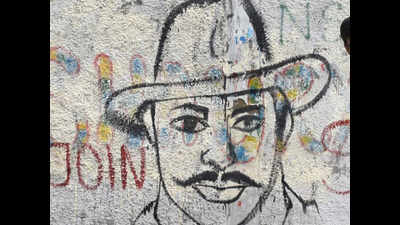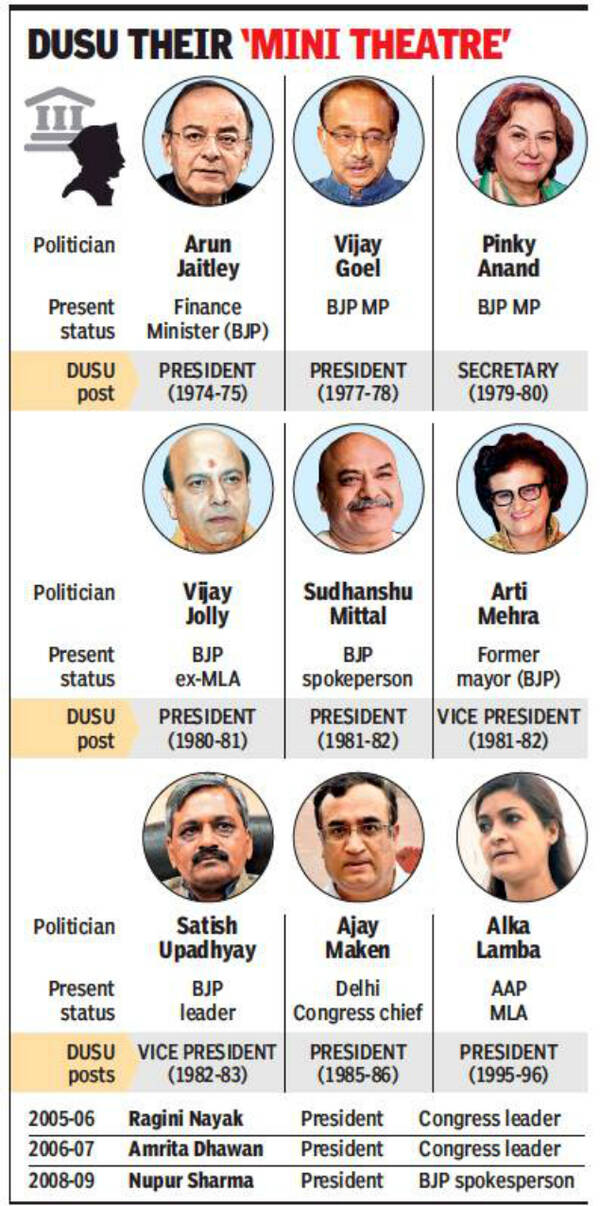- News
- City News
- delhi News
- Why Delhi University Students’ Union win can be sign of things to come
Trending
This story is from September 3, 2018
Why Delhi University Students’ Union win can be sign of things to come

Delhi University elections (File photo)
NEW DELHI: Winning in the Delhi University Students’ Union election is not simply an entitlement to a year in an influential youth post. The students’ union is a veritable springboard to politics, and a CV with an election victory has cachet among national political parties. That is why rather than being a mere university body polls, the annual campaign for DUSU is when the parties put potential party leaders through the wringer.
The fact that DUSU office bearers have it in them to take up the biggest political assignments later in life is clear from the list that carries names like Union Finance minister Arun Jaitley, Delhi Congress chief Ajay Maken, BJP leader Satish Upadhyay and Aam Aadmi Party MLA Alka Lamba.

Upadhyay testifies to how winning the post of vice-president prepared him for bigger things when he says, “DUSU politics gives you political maturity and teaches you how and when to react to certain situations. If elected, in a small way one gets an experience of how to govern.”
Congress spokesperson Ragini Nayak, who was DUSU president in 2005-06, takes the explanation a step further. “I look at all students’ union elections, including DUSU’s, as nurturing and training grounds for holistic development of young citizens, making them conscious of their socio-political rights and duties,” she says. For decades, DUSU has helped the youth inculcate a culture of proactive political participation, awakened their political consciousness, and channelled their social obligations and a desire for social change.
Of course, winning a DUSU post by itself does not confer unchallengeable rights on a future politician. Congress leader Amrita Dhawan, who was president in 2006-07 as a NSUI winner, believes that Delhi University indeed provides a platform for those interested in active politics, but only if they are hard workers.
“To become active in student politics, one needs to be responsible. To win, one has to be an extraordinary student leader. But only after your hard work is recognised by a party are you assured of climbing up the ladder,” Dhawan points out, before adding in a tone of finality, “Just by winning the DUSU polls, you don’t automatically become a national leader.”
Because becoming a union post holder through elections is such a testing task and because it provides a lifelong political conditioning, the temptation to win at all costs is now a bane that infects all candidates. AAP leader and Delhi MLA Alka Lamba, who was DUSU president in 1995-96, rues this attitude. “Poll-time campus violence has certainly reduced the sanctity of the elections,” she frowns.
Kumar concurs with this, but observes that since Delhi University is only a microcosm of national politics, it also entails a similar use of money and muscle power.
The fact that DUSU office bearers have it in them to take up the biggest political assignments later in life is clear from the list that carries names like Union Finance minister Arun Jaitley, Delhi Congress chief Ajay Maken, BJP leader Satish Upadhyay and Aam Aadmi Party MLA Alka Lamba.

Upadhyay testifies to how winning the post of vice-president prepared him for bigger things when he says, “DUSU politics gives you political maturity and teaches you how and when to react to certain situations. If elected, in a small way one gets an experience of how to govern.”
Indeed, political scientist Anand Kumar, a former JNU teacher, gives DU the epithet of “mini theatre of national politics” and notes that the national parties are ready to invest money in the elections to the students’ union “so young leaders are able to learn how to debate, win, lose and be tolerant of different ideologies”.
Congress spokesperson Ragini Nayak, who was DUSU president in 2005-06, takes the explanation a step further. “I look at all students’ union elections, including DUSU’s, as nurturing and training grounds for holistic development of young citizens, making them conscious of their socio-political rights and duties,” she says. For decades, DUSU has helped the youth inculcate a culture of proactive political participation, awakened their political consciousness, and channelled their social obligations and a desire for social change.
Of course, winning a DUSU post by itself does not confer unchallengeable rights on a future politician. Congress leader Amrita Dhawan, who was president in 2006-07 as a NSUI winner, believes that Delhi University indeed provides a platform for those interested in active politics, but only if they are hard workers.
“To become active in student politics, one needs to be responsible. To win, one has to be an extraordinary student leader. But only after your hard work is recognised by a party are you assured of climbing up the ladder,” Dhawan points out, before adding in a tone of finality, “Just by winning the DUSU polls, you don’t automatically become a national leader.”
Because becoming a union post holder through elections is such a testing task and because it provides a lifelong political conditioning, the temptation to win at all costs is now a bane that infects all candidates. AAP leader and Delhi MLA Alka Lamba, who was DUSU president in 1995-96, rues this attitude. “Poll-time campus violence has certainly reduced the sanctity of the elections,” she frowns.
Kumar concurs with this, but observes that since Delhi University is only a microcosm of national politics, it also entails a similar use of money and muscle power.
End of Article
FOLLOW US ON SOCIAL MEDIA










